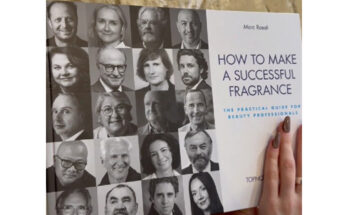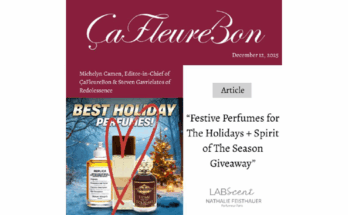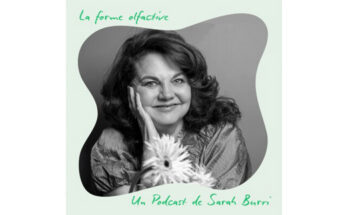Thank you Kristina Kybartaitė-Damulė for this moment ! 🙏🙏It was great sharing with you, Thank you.
By Kristina Kybrataite-Damule, on Plezuro|Mag, February 12th 2025
“Master Perfumer Nathalie Feisthauer has spent around 40 years shaping the fragrance world, creating perfumes for both niche houses and global brands. From her early struggles breaking into the secretive industry to establishing her own independent studio in Montmartre, her journey is one of passion, talent, and hard work.

It would be difficult to meet a person who cares even a little about perfumes and hasn’t tried something created by Master Perfumer Nathalie Feisthauer. She has crafted perfumes not only for niche brands but also for well-known designer and high-street brands, and her portfolio, spanning around 40 years, includes close to 200 perfumes.
I myself became familiar with some of her creations in a very young age. Of course, back then, when I smelled Giordani Gold from my mom’s Oriflame sample set, I couldn’t have imagined that one day I would have the chance to interview the charismatic and lovely person behind it. Funny how life works sometimes.
In an open interview for PlezuroMag, Ms. Feisthauer shared the story of her not-so-easy beginning in the perfume industry, the challenges she overcame, and the journey of building her own company in beautiful Montmartre. She also revealed the most personal perfume she has created and shared her thoughts on the contemporary perfume industry.
Let’s begin with a standard question – how did you get into perfumes, and when did you know you wanted to be a perfumer?
When I was 16, I had no clue about perfume, and the first time I smelled perfume, I smelled Opium. It was so beautiful, and it was really like love at first sight. It was a revelation. I thought, “Perfume is so incredible; I want to smell it again.” And I became obsessed. I wanted to smell more and more perfumes. At that time, 40 years ago, I didn’t know the job existed. I didn’t even dream of being a perfumer. Actually, I wanted to be something that I didn’t know existed.
And as I understand, your family is not related to perfumery?
Not at all. I come from near the German border, Sarrebourg. There, nobody wore perfume, nobody cared about perfume, and nobody had a clue about perfume.
And was it challenging to get into that field?
Yes and no. No, because I loved perfumes so much that it was easy. And I think maybe I was talented. I was working hard, and I was talented, so that part was not challenging.
The part that was challenging was the code because it’s a very secretive industry. Usually, you become a perfumer because your father, grandfather, or uncle is a perfumer. So they all had the code. And I didn’t have the code. That part was difficult and scary for me.

And how did you overcome that?
Truly, it was painful because I never knew if it was not enough, too much, how to do this, how to speak—there was a lot of code. I didn’t go on fancy vacations with my family, I didn’t have a 30-year-long story about perfumes. So I felt I didn’t belong at first because, actually, I was the first one to be in the perfume school Roure, which is now called Givaudan, without having any connection to the perfume world. When I went there, people really didn’t believe that I had no connections because usually, you needed to have one. So for me, navigating the code was the challenge. Now, I’m very at ease, I’m totally fine, but I would say that for five to ten years, it was a struggle.
I think that 40 years ago, it was not like it is now. Now, I think even if you live in a small town, you can be exposed to a lot of luxury, or if you have a passion, you can follow it. Forty-five years ago, things were much more separated, and you didn’t have access.
Besides that, what else have you noticed has changed in the perfume industry over the years?
When I started in the perfume industry, we had maybe one or two launches a year, maybe five at most. It was very secretive. Even inside the company, sometimes you didn’t know what your neighbor next door was working on. It was a very secret, elite, long-term, detailed craft.
Now, anybody can work in the industry. I always say that nowadays, with chromatography, it’s not the same game.
Let’s talk a little bit about your career. You worked at Givaudan and Symrise, and then you created Lab Scent. Can you tell me a little bit more? How did you decide to become an independent perfumer?
To be honest with you, I would have been the last person to think I’d have my own company because I loved every single day working on big projects in big companies, taking care of nothing else but my craft. When you work for a big company, you don’t decide which projects you work on. You’re not the one negotiating which client you work for, the price, etc. It’s very comfortable. But at the end of the day, you don’t decide anything.
And I loved every single day—until I didn’t. I couldn’t anymore. I was working with big corporate clients. A lot of them were great, but many were arrogant and disrespectful toward the work of a perfumer. You work for two, three, five years on the same theme, and the theme is basically, “Make something like Coco Mademoiselle.” It was not exciting. All of a sudden, I couldn’t stand it anymore, and maybe they couldn’t stand me either. It just wasn’t for me anymore.
I knew what I didn’t want to do, but I didn’t know what I could do at this stage. When I created my company, what I loved most was something I never got to do at Givaudan or anywhere else—I now talk directly to my clients. I don’t have a salesman. I don’t have an evaluator. Having an evaluator is like being a painter who has someone next to them saying, “Oh, maybe you should use lime green because it’s fashionable.” Imagine a painter having someone telling them what to put on their canvas—that’s kind of what they do to us.
So I love working without an evaluator, and I love speaking directly with my clients. And what I enjoy most about my clients is that they are people who own their own companies. That means they are the ones making the decisions. It’s not 20 people from a big corporate marketing team. They have a vision, they have a connection to the work, and that’s when I feel best as a perfumer—when there’s a vision and a story to tell. When I can talk to a real person, not marketing people with no decision-making power.

Your studio is located in Montmartre, in such a beautiful place. How did you choose it?
Ah, it’s the best place. Actually, I’m very lucky because I live in Montmartre. I have a house, and on the rooftop, I have a garden where I can eat, host parties, and relax. So that’s really great. And my studio is just 70 meters away from my home. So I go back and forth all day, two or three times a day.
Does living in Montmartre inspire you in any way?
I could not live anywhere else. Montmartre is on a hill, and people don’t like to go there because there are a lot of stairs. There’s only one way up.
When my children were young, I used to drop them off at school, and I’d walk past a house with a garden full of flowers and see cats strolling in the street. You know a lot of your neighbors, you say hi, you have coffee, you have dinner. Living in Montmartre is different, but it’s such a wonderful place to be.
Plus, the inspiration. In the 1920s, Pablo Picasso’s first studio was on my street. Van Gogh wasn’t far away either, nor was Monet and many others—they all lived in Montmartre. And it’s so beautiful, like a tiny village. I don’t like to go outside Montmartre (laughs).
Can you tell us a little bit about your creative process? How do you usually start creating a perfume?
It always starts with a brief, always with a conversation with my clients. There are the usual questions you have to ask everyone—price per kilo, dosage, how much they want to order, whether it’s unisex, if it’s a perfume, if it’s sold only in Dubai or China, or if it’s sold worldwide. Those technical questions apply to every project.
And then, the best projects always have a strong idea behind them. It can be anything—a story, a place, an ingredient.
What I like to do is to create what the client asks for, and not always, but sometimes also take a step aside, improve, and see how people react. I also think that when you create a perfume, having a very strong technique is very important. A strong technique allows you to go wherever you want. Just having ideas is not enough, and technique alone is not enough. I really believe in work and talent.
Do you have any materials that you especially like to work with?
I like wood, I like spice, I like flowers. I like resins. I can do fruity as well. But I also think there are a lot of ingredients that are not useful, and I remove them.
Do you have any particular notes that you don’t want to touch?
No, I don’t care. It’s like being an actress—you have to play a pedophile, a burglar, a prostitute, or a nun. You don’t need to like or agree with the role. Actually, if people push me outside my comfort zone, I’m happy. Sometimes it’s even more interesting.
Have you ever created a perfume that is very personal to you?
Yes, a few, like Puredistance No.12. For me, it’s very, very elegant. The original vision is from the ’50s–’60s, when people were so elegant, with those dresses with the waist—so pretty. You know Mad Men? That kind of beauty. And I’m totally the opposite. I’m always in jeans, my hair however it is (laughs). And sometimes, when I see those women from that time, they look so beautiful. I wish I could be like that, which is not me at all. So yes, for me, Puredistance No.12 represents a version of myself that doesn’t exist.
What trends do you notice in today’s perfumery?
There are still people who go to, let’s say, Sephora and buy whatever is big at that moment. And those people are happy—they feel beautiful wearing La Vie Est Belle or another popular perfume. There’s nothing wrong with that. But I also notice, more and more, people who want to explore and be unique. Now, people see perfume more as a form of art, something aesthetic. They don’t care if it’s masculine or feminine—they just want something unique. And this trend is growing.

Do you wear perfume yourself daily?
Rarely, because when you work, you wear a lot of perfumes that you’re working on, so I usually keep my skin clean for work. But if I do wear perfume, I usually like to wear Opium.
Many well-known perfumers lately are launching their own brands. Do you have any plans to do that?
No, because I already spend a lot of time doing interviews, posting, etc., and I’m happy to do it, but I don’t want it to be my main occupation. If you have a brand, you really have to do a lot of interviews with journalists, attend launch parties, be everywhere, and travel a lot. You also need to handle distribution and negotiate prices, and I don’t want that. I love my job as it is. So no.
Could you give some advice to young perfumers who are just starting out?
That’s difficult. I wouldn’t want to be a young perfumer nowadays. If you’re a young perfumer, I think you should look into AI because AI will take over a lot of the work. Some perfumes can be done better by AI. It’s not like before when perfumers were only French, and you knew you would have a job, a salary, and a lot of money. Now, a lot more people can work as perfumers, often for a lot less.
If I were a young perfumer, I would also look into clean perfumery. Almost everything you do is polluting, so I think there is a big trend toward natural ingredients and sustainability. You have to learn about that.
There are a lot of perfume schools, but only one or two students—sometimes none—will actually become perfumers. Even if you’re good, there aren’t many positions available. That’s the truth.
Thank you for your time.”
Original article : Breaking the Code: Interview with Nathalie Feisthauer — PLEZURO | MAG



